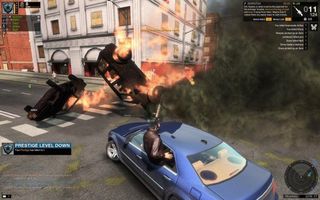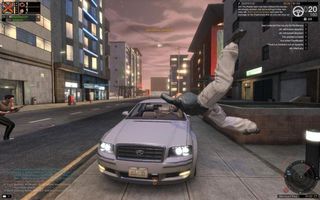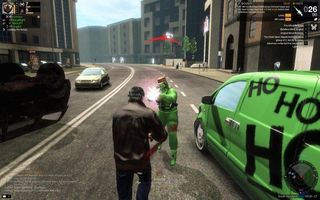Interview: GamersFirst on bringing back APB

As reported last week, cops and robbers MMO APB has been bought by GamersFirst, who have announced that the game will return as a free-to-play game in the first half of next year. We've had a chat with GamersFirst CTO and COO, Bjorn Book-Larsson about the next chapter for the troubled MMO, discussing the game's potential, the new features GamersFirst will be working on, and the reasons why APB failed in the first place.
PC Gamer: Why did you decide to buy APB?
Bjorn Book-Larsson: From our side we initially thought it was a really good concept. So from a distance we had said “hey, this seems like an interesting new title, it seems like there's a lot of customisation and user generated content features”, and we were interested in the game, on a professional level, from the outside. Then what happened was, we picked up the game because, from our point of view we think that it has a lot of really good critical components that can make a good foundation for a long term free-to-play project. The huge difference between free-to-play and retail sales is that with retail sales you have to make your numbers in the first 30 days, and in the free-to-play model you have the expectation and/or luxury of putting the game out there, and modifying it to match what people actually do in the game. For us we think that the game has a lot of really good features. It has a lot of customisation parts, and it has various innovative ideas and ways to expand the traditional shooter genre. The things that were problems, like the balancing, and the weird monetization methods are things that we feel pretty confident we can address, especially because we have about seven years of publishing experience in the free-to-play space. Drawing on all that experience, we're taking all the things we learned from all those other games and incorporating them into APB.
PC Gamer: What is it about APB that makes it suitable for a free to play model?
Bjorn Book-Larsson: Well, it already has a lot of components that we want in free-to-play. It already had an in game trading system so you can trade things back and forth, which is usually an important component to free-to-play experiences. It has very a evolved concept of “choose this side”. We have a game called Knight Online where we have two nations fighting, it has a lot of elements that we have seen be successful in free to play games. We don't think it's there yet, because one of the key things in a free-to-play game is that you actually have to make it fun and engaging for the free player, and then for those who do microtransactions and/or become premium members, or premium players by making a purchase, they have to have some slight benefit or advantage in the game, but you also still have to maintain the balance throughout the game so that the two types of players continue having fun, so there's a lot of that type of balancing that we have to work on to make it work, but we feel like it has the bones, the skeleton of a potentially really good free-to-play title, and we have to get there in the next six months or so, and then we can release it as a free-to-play title.

PC Gamer: You mentioned microtransactions and a premium service, what kind of items will players be buying in APB, and what would the premium service involve?
Bjorn Book-Larsson: There's many different models for the free-to-play games We have another game called War Rock. War Rock was a game made in Korea back in 2006, we launched it in the US and the world in 2007, so it's sort of a last generation game, but it has a lot of innovative ideas. Basically we're going to borrow some things from those types of titles, other games like Combat Arms, which we don't publish, but there's other games like that out there. One of the easiest things to do with this game would be to add leased weapons, so for thirty days you lease certain weapon types. Then for premium access you would essentially allow certain expanded features or complexities of customisation for those who are premium players, and those who are free players get less complex things included in the basic membership level. Beyond that, there's multiple ways to monetize free-to-play shooter games. The leasing method is probably the simplest and most straightforward. There's another method called the 'wear method' where you pay because your guns wear out, you have to repair them. There's another one that we generally refer to as the 'grinding and trading' method, which is more common in RPGs, and then there's another one called the 'insurance model' where you get to build stuff, but they blow up, and if they blow up you can have insurance to cover your losses, if you will. What's interesting about free to play is that there are a lot of financial models behind it that actually mimic real world systems, so you drive on the same real world motivations. The reason you buy insurance for your car is because you don't want to lose the whole thing. You don't necessarily pay subscription fee to have a car, you might have car payments for it, but you'll have insurance, so there's models like that which work in other games. What we're going to do is, initially, we won't go there across all those models. We're starting very simple, just adding the two core components that have worked well in our other shooters players, and that would be just leased weapons and premium accounts or premium services.
PC Gamer Newsletter
Sign up to get the best content of the week, and great gaming deals, as picked by the editors.
PC Gamer: Apart from putting in the new payment model, will you be making any changes to the mechanics of the game itself?
Bjorn Book-Larsson: Some. There's more balancing issues. One of the key issues the game seemed to have when it came out, what happened was, first of all you had to pay for game time, which was sort of weird. The second thing was, if you showed up in a game, because of their version of progression, if you got shot when you turned up in a match, you might be shot by a gun that you had no access to, because you hadn't gotten murdered for nine hours yet, so you didn't have the gun. I think that a lot of those things will remain, but now make more sense. If you're a free player and you don't want to buy the premium weapons then you can grind and eventually earn it, but you don't have to necessarily pay for that painful grinding process. I think they accidentally created was, in this game, you had to actually pay to grind, which is unheard of in the free-to-play space. Those kind of balances are the ones we'll focus on the most. There's a few other balances too, such as, for instance, individual gun balances, which we do want to modify, so things like gun ranges and the disparity between weapons actually has to be much less. We've found from other games that you want to have just a couple of percentage points of balance difference between weapons, otherwise it becomes essentially a slaughterfest one way or another. So there's various balance fixes like that, and then there's various small annoying things, and this may not be in the first re-release, but when you run up to a car you often accidentally end up in the back seat, which is a little surprising! There are rare situations where you would probably want to be in the back seat, but 80 or 90 percent of the time you want to be drivers seat because the car's empty. I think the original designers were very concerned with some purity of design which may have gotten in the way of the gameplay.

PC Gamer: Why do you think APB failed on its first release?
Bjorn Book-Larsson: I think part of it of course was that it was such a huge investment. I mean, the expectations were huge, and therefore when it didn't start paying off in the first month or so it was almost doomed on its own expectations. I think it actually had the potential in the long term to potentially work, and obviously we believe it'll work in the long term, but I think the hybrid retail subscription model that they had tried, for the mechanic they designed I don't think it was going to work, ever. In order to succeed with that mechanic you would have to really polish some of the core components in order to convince enough players to be a subscriber. If you look at other games like Eve Online, Eve Online started as a modest, much smaller game, and over time they grew it, it got more and more of a devoted fanbase, and it really took several years before it got to the level where it is today. I think that's the kind of game development structure they would have to keep in mind, like they should probably have considered going out with some sort of live beta, be in a live beta for a year or more, preferably with thousands of players participating in order to polish the game, in order to make it something that was sustainable. I don't think they had planned that in, it was more planned as a retail release with EA pushing a bunch of boxes everywhere. I think the issue there is that the traditional publishers haven't really yet – EA has experimented quite a bit with the digital distribution sales type stuff, but I think the free-to-play model is very hard for traditional publishers to predict, and if you don't do a straight retail or console title it's a very very long term, nefarious, difficult to predict process. I just don't think they had the stomach to go all out, which I actually think would have worked for them.
PC Gamer: Then the advantage of the free to play model is that you can have the game out there for a long time, have a lot of people playing it, and then update it as it goes on.
Bjorn Book-Larsson: Yeah. I mean, in fact, we'd say about 80 percent of the work may happen after the game goes live, so to some extent not a lot of work goes in initially, but we have games today that have really existed as games for as much ten years, and then they have as many as 50,000 simultaneous players even ten years after they initially were launched, so these are pretty substantial MMOs. I guess the concept is surprisingly simple, which is: in a free to play game, no-one will pay for it unless they have fun. Surprise! So the net results is that you have to spend all your efforts following users around, figuring out what it is they do that is fun, and then effectively focus on giving them more stuff in the areas where they spend most of their time, around the things that they prefer to do. Often we're surprised at what users actually do. We might design something because we think “hey, this'll be great”, and they don't even do it, but they find an alternate use of something we did, and they go off on a complete tangent and do stuff. I think being humble about the fact that as a designer you can't so much predict what users will do so much as throw out a lot of good ideas and hope that users latch on to some of them, and then you have to measure and measure and measure what people do.
PC Gamer: So player feedback will play an important part in APB's development?
Bjorn Book-Larsson: Yeah, I mean, as a company we're called GamersFirst, and the reason is our goal is to follow what gamers do and give them that. We've existed as a company for seven years and it's funny because we're not especially huge or well known, we're somewhat known, but it's one of those things where the velocity of this type of release cycle is that the game should last, and almost be a platform from which you launch a lot of different experiences. With War Rock for instance, we just launched a collaborative mode where you play with team members as opposed to trying to kill everyone else, and it was huge, it turned out there was a huge demand for that type of gameplay mode, so we're continuously doing that kind of work, and those are the kinds of things that we have to bring to APB as well.

PC Gamer: What new experiences do you want to add to APB as it develops?
Bjorn Book-Larsson: In the short term, obviously, a lot of things. It would be great if there was a way for clans or teams to have more collaboration, because right now you get thrown out in to a big city and it's a little bit tricky or difficult to pick encounters against other teams. If you think of things like the e-sports leagues that are out there in Europe, in War Rock for instance we have a lot of clan versus clan fights, so we do want to set up a method for those smaller groupings to stay coherent, because that kind of social dynamic will actually perpetuate the game much longer than an individual experience. I think if you look at the design of the game, it was very tailored towards an online individual experience to some extent, because you were thrown into a large group of people, but there wasn't really a direct mode for clans to take on another clan and be ranked against them, or there wasn't an easy way to do it, it wasn't central. I think that's one of the first things we'll do. We might accomplish that by adding some session based gameplay. There are a couple of maps that the original had already finished, so we might bring those out and let people join those smaller maps in some form of clan mode. There's other changes as well, there were some interesting concepts around the cars, there was some potential racing components that existed in the original code, so there are various experiences like that which are close at hand. I think, three to five years out, the goal would be to take advantage of the really cool customisation tools, and potentially build several different game experiences like this around the game. Because it already has a really solid social district, there's nothing really stopping us from allowing you to enter different worlds of engagement from that social district, not necessarily just the large scale San Paro financial districts, but you could go do collaborative gameplay, or a session based game, or some other kind of interactions using that same character that you've built.
PC Gamer: It sounds like you're taking hold of some ideas that were already in the code that Realtime worlds didn't implement, and using that as a jumping off point?
Bjorn Book-Larsson: Yeah, we're sort of trying to reuse what they had started with, but I think there are a lot of things that weren't even built in code which we're going to have to add, but obviously the first few months is really focused on consolidating on the things that are there. In the real long term, we're trying to envision: what if we wanted to launch multiple game experiences based on different user types? One of the things to keep in mind is that as a company we have about 30 million registered users, out of which about half are registered to play shooter games, so those users, quite a large audience, are ready, and we have a pretty good idea of how they behave and what they play. So we can tell you how many of those have signed up to play collaboratively as opposed to competitively within the shooter groups, so based on that we can tailor game changes to what it is that they want to do.

PC Gamer: So obviously there's a lot to be added to the game, is there anything you're taking out?
Bjorn Book-Larsson: Possibly we will try to reduce parts of the game. One of the issues is that the game client is quite large, so what we might look to do is try to create two versions of the client, one which is a smaller version, and one which is an improved version. Those are details to be worked out after the first batch of changes. We might have a starter pack, and then an enthusiast version for those who have the latest and greatest hardware.
PC Gamer: When the game comes out, are there any plans to gift items or services to players who have already paid for APB?
Bjorn Book-Larsson: We will try to accommodate those former players if we can. The issue is that of course the former players were distributed to by EA, and I know that EA has been giving refunds, and we're not really engaged with that process. It's a tricky question that we don't have an answer to yet, if there's a technical or even operational way to recognise all the former players then we will. If there's not, then some of them may have to start over, but at least we hope they can reclaim the characters that they created, but they'll have to create new accounts on our services in order to do so.
PC Gamer: So you do plan to let people take through characters they've already created?
Bjorn Book-Larsson: If possible, that's a huge caveat. Obviously, as you can imagine, since EA has been doing the distribution there has been a lot of somewhat unanswered questions around that. Once that gets worked out, which I actually think will take a little bit of time, we would probably have a solid answer at the end of this year.
PC Gamer: Thanks for your time.
Part of the UK team, Tom was with PC Gamer at the very beginning of the website's launch—first as a news writer, and then as online editor until his departure in 2020. His specialties are strategy games, action RPGs, hack ‘n slash games, digital card games… basically anything that he can fit on a hard drive. His final boss form is Deckard Cain.
Most Popular






